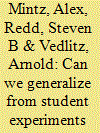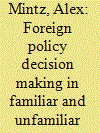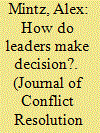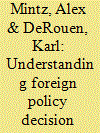| Srl | Item |
| 1 |
ID:
073765


|
|
|
|
|
| Publication |
2006.
|
| Summary/Abstract |
The authors conducted an experiment with a group of military officers and replicated it with a group of students at a public university in the United States. The experimental scenario dealt with a decision problem in the area of counterterrorism. The authors found that while more than one-third of students recommended doing nothing, the overwhelming majority of military officers (more than 90 percent) recommended doing something. Also, military officers exhibited less maximizing and more satisfacing decision making than students. The results show that relying on experiments with students "playing" the role of real-world national security policy makers may bias the results. The two groups are, in fact, very different. Based on student samples, it is possible to accept propositions that would not be found with samples of elite decision makers and reject propositions that may be right. However, it is possible that students can be assigned to experiments where they represent the "public" and not elites.
|
|
|
|
|
|
|
|
|
|
|
|
|
|
|
|
| 2 |
ID:
001050


|
|
|
|
|
| Publication |
Boulder, Lynne Rienner, 1997.
|
| Description |
x,256p.
|
| Standard Number |
1555877214
|
|
|
|
|
|
|
|
|
|
|
|
Copies: C:1/I:0,R:0,Q:0
Circulation
| Accession# | Call# | Current Location | Status | Policy | Location |
| 039566 | 327/GEV 039566 | Main | On Shelf | General | |
|
|
|
|
| 3 |
ID:
065703


|
|
|
| 4 |
ID:
065698


|
|
|
| 5 |
ID:
060542


|
|
|
|
|
| Publication |
Lanham, Lexington, 2005.
|
| Description |
281p.
|
|
|
|
|
|
|
|
|
|
|
|
Copies: C:1/I:0,R:0,Q:0
Circulation
| Accession# | Call# | Current Location | Status | Policy | Location |
| 049481 | 327.101/MIN 049481 | Main | On Shelf | General | |
|
|
|
|
| 6 |
ID:
097560


|
|
|
|
|
| Publication |
Cambridge, Cambridge University Press, 2010.
|
| Description |
xi, 208p.
|
| Standard Number |
9780521700092
|
|
|
|
|
|
|
|
|
|
|
|
Copies: C:1/I:0,R:0,Q:0
Circulation
| Accession# | Call# | Current Location | Status | Policy | Location |
| 055096 | 327.101/MIN 055096 | Main | On Shelf | General | |
|
|
|
|
| 7 |
ID:
061577


|
|
|
|
|
| Publication |
May-Jun 2005.
|
| Summary/Abstract |
An analysis of three years of suicide bombing data in Israel reveals an increase in such attacks through March 2002 followed by a steep decline through the end of 2003. The authors propose a terror-stock model that treats the suicide bombing attack rate as a function of the number of terrorists available to plan and execute suicide bombings. The intent of Israeli tactics such as targeted killings and preemptive arrests is to reduce the capacity of terror organizations to commit attacks. When fit to the data, this model suggests that the targeted killing of terror suspects sparks estimated recruitment to the terror stock that increases rather than decreases the rate of suicide bombings. Surprisingly, only the deaths of suspected terrorists, and not Palestinian civilians, are associated with such estimated recruitment. Although Israeli actions have reduced the rate of suicide bombings over time, it is preventive arrests rather than targeted killings that seem more responsible for this outcome.
|
|
|
|
|
|
|
|
|
|
|
|
|
|
|
|